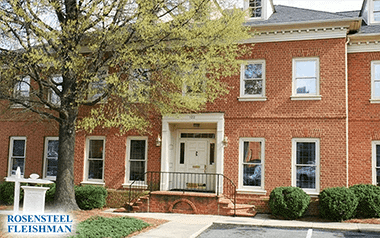Defense Lawyer for Domestic Violence Protective Order

A domestic violence protective order can be imposed either (1) temporarily to protect a person who believes that there is a danger of serious and immediate injury or (2) for a period of up to one year if a court finds that an act of domestic violence occurred. The violation of a domestic violence protective order can have serious consequences, including increased punishment for crimes committed. It is important to know the terms of such order to prevent a violation, and Mr. Rosensteel can assist you in this process. If you are charged with a domestic violence protective order violation, contact Mr. Rosensteel so that we can begin the process of preparing your defense as soon as possible.
Domestic Violence Protective Orders
There are two types of protective orders that a court may grant in connection with acts of domestic violence. A court may grant a temporary protective order to protect a party alleging that there is a danger of domestic violence. (G.S. 50B-2) This temporary protective order is also known as an ex parte order and can be issued on the same day as the complaint for domestic violence protective order is filed. The person filing for a temporary protective order must believe that “there is a danger of serious and immediate injury to himself or herself or a minor child.” The temporary protective order remains in place until the later of 10 days after the order is issued or 7 days after the offender is served.
If a court finds that an act of domestic violence did occur, it may grant a final domestic violence protective order. (G.S. 50B-3) A final domestic violence protective order lasts for a fixed period of time up to one year. The court may renew the protective order for another fixed period of time not more than two years for good cause. (G.S. 50B-3(b)) However, the court may not extend any award of temporary custody of minor children beyond the initial one year period.
Protective orders can include terms such as:
- Prohibiting the offender from threatening or harassing (including by telephone) the aggrieved party.
- Granting temporary custody of minor children.
- Allowing the aggrieved party to live in the residence, even if it was shared with the offender, and excluding the offender from the residence.
- Requiring the payment of child or spousal support.
- Prohibiting the offender from possessing a firearm.
- Requiring the offender to attend a domestic violence treatment program.
- Any other terms that the court deems necessary.
(G.S. 50B-3(a))
Domestic violence is defined in North Carolina as committing an act of bodily injury, causing fear of bodily injury, or committing a sex offense upon a person with whom the offender has a personal relationship or a child of such a person. Specifically, G.S. 50B-1(a) states that
Domestic violence means the commission of one or more of the following acts upon an aggrieved party or upon a minor child residing with or in the custody of the aggrieved party by a person with whom the aggrieved party has or has had a personal relationship, but does not include acts of self-defense:
- Attempting to cause bodily injury, or intentionally causing bodily injury; or
- Placing the aggrieved party or a member of the aggrieved party’s family or household in fear of imminent serious bodily injury or continued harassment, as defined in G.S. 14-277.3A, that rises to such a level as to inflict substantial emotional distress; or
- Committing any act defined in G.S. 14-27.2 through G.S. 14-27.7.
As noted above, the statute requires that the offender and the aggrieved party have a “personal relationship.” This is defined by statute as a relationship where the two parties are:
- Are current or former spouses;
- Are persons of opposite sex who live together or have lived together;
- Are related as parents and children, including others acting in loco parentis to a minor child, or as grandparents and grandchildren. For purposes of this subdivision, an aggrieved party may not obtain an order of protection against a child or grandchild under the age of 16;
- Have a child in common;
- Are current or former household members;
- Are persons of the opposite sex who are in a dating relationship or have been in a dating relationship. For purposes of this subdivision, a dating relationship is one wherein the parties are romantically involved over time and on a continuous basis during the course of the relationship. A casual acquaintance or ordinary fraternization between persons in a business or social context is not a dating relationship.
Domestic Violence Protective Orders
Knowingly violating a domestic violence protective order can have a number of consequences. These consequences apply to violations of both temporary and final protective orders because a “valid protective order” is defined to include “an emergency or ex parte order entered under” the Domestic Violence chapter. (G.S. 50B-4.1(h))
If a person knowingly violates a valid protective order, he is guilty of a Class A1 misdemeanor. (G.S. 50B-4.1(a)) If a person commits a felony and the person knows that the behavior is prohibited by a valid protective order, he is guilty of a felony one class higher than the principal felony. (G.S. 50B-4.1(b)) However, this raising of the felony class does not apply to a person charged with a Class A or B1 felony.
If a person knowingly violates a valid protective order and he has previously been convicted of two domestic violence offenses, he is guilty of a Class H felony. (G.S. 50B-4.1(f)) If a person possesses a deadly weapon and knowingly violates a valid protective order by failing to stay away from a place or person, he is guilty of a Class H felony. (G.S. 50B-4.1(g)) If a person subject to a valid protective order enters a safe house for domestic violence victims where the protected person is residing (whether or not the protected person is actually present), he is guilty of a Class H felony. (G.S. 50B-4.1(g1))
What does it mean to knowingly violate a domestic violence protective order? If a domestic violence protective order has been served on the offender, knowledge of the terms of the domestic violence protective order is presumed.
Speak to a Charlotte, NC Criminal Defense Lawyer Today
Domestic violence charges are serious and can have a profound impact on your life, your relationships, and your future. If you have been charged with a domestic violence offense, it is critical that you act quickly to protect your rights and your future.
The experienced criminal defense lawyers at Rosensteel Fleishman Car Accident & Injury Lawyers have a thorough understanding of North Carolina domestic violence laws and are prepared to help you defend against these charges. Whether you are facing a first-time allegation or a repeat offense, our attorneys will work diligently to protect your rights and pursue a resolution that reflects your best interests.
Don't take chances with your future. Contact Rosensteel Fleishman (704) 714-1450, to schedule a consultation with a Charlotte domestic violence lawyer today. We will listen to your concerns, explain your rights and options, and help you make an informed decision about how to proceed.

